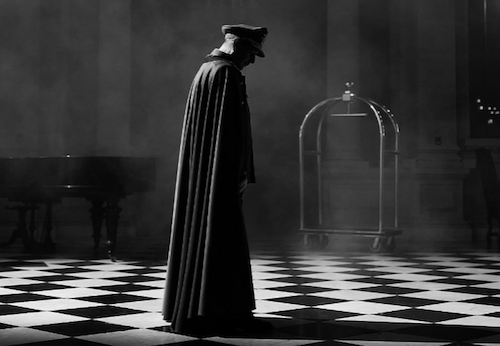El Conde
Written by Andreas Babiolakis
In case it wasn’t obvious before, Chilean director Pablo Larraín loves to satirize (or, at least, he likes to go against the grain with how he depicts history and public figures). He has gone fully Bardo this time around with an extremely bleak comedy full of arthouse scorn that bends how reality can be represented. Larraín is going after the infamous Chilean dictator Augusto Pinochet, whose reign lasted from 1973 to 1990. El Conde turns Pinochet into a centuries-old vampire who feigns his own death and finds that no one cares. This is only the start of this film, and it proceeds to get increasingly more and more insane. I love that Larraín is willing to go off the rails whenever he desires, and El Conde is no different. The film reads like Béla Tarr’s Sátántangó with its obsidian colour scheme, David Lynch’s Eraserhead with the nightmarish takes on everyday living (albeit in a more political sense here), and like a Jean-Pierre Jeunet depiction of mannerisms. Needless to say, El Conde is full of style and imaginative, absurd commentary.
I find that Larraín is typically great at getting to the heart of what he is trying to say via allegory or surreal imagery, but El Conde is maybe the first time that I feel like the auteur has laid his symbolism on a bit thick. Pinochet is a vampire who won’t die already, clearly indicating his decades-long time in power. He feasts on organs and blood, resembling the ways he went against people and also embezzled money. This is just our protagonist of the film and already these comparisons feel so on the nose; no matter how fitting they may be, it feels a bit primitive. Many other symbols throughout El Conde are considerably hit-or-miss, either feeling like Larraín’s signature take on otherworldliness or like the hastily made decisions that Pinochet himself feels like here. Nonetheless, I feel like some of the obviousness of El Conde detracts from the oozing mysteriousness that the film otherwise emits. This could make for an interesting dichotomy of political rebellion, given the multifaceted complexities of such commentary, but El Conde doesn’t really feel all that layered, so the contrast between low-hanging fruit and fascinatingly abstract parallels is never made. Both kind of exist on their own, and it’s a game of will-it, won't-it when it comes down to which gags and proclamations will work with you. Contextually, El Conde is sadly a mixed bag.
El Conde lays the satire on thick, but it still feels quite rewarding.
All that aside, I think El Conde is still quite good at what it does as a story (even if it is imbalanced as a satire). The tirade of Pinochet is portrayed as a history-spanning series of buffoonery, where nearly every move he makes is ridiculed in a heap of ways (for his monstrosities, his idiocies, or his ineptitude). I can only imagine that those who lived during his time in office will watch El Conde with the catharsis that Larraín wants them to have. For the rest of us, this is one hell of a “history” lesson (one that’s based on emotions and not fact, mind you). The aesthetics are on point here, with mesmerizing photography that both caricatures its subject matter while placing you in a dismal well and left to fester with these plaguing visions and haunting music that acts like a serenade from the seventh layer of hell. These help the film work cohesively. There’s always something to see or hear amidst the hodgepodge of references and jokes. El Conde feels like a feature-length political cartoon which may not be your own personal idea of a good time, but I think its strengths outweigh its occasional weaknesses because of its commitment to this disgusted viewpoint of a terrible man.
Andreas Babiolakis has a Masters degree in Film and Photography Preservation and Collections Management from Ryerson University, as well as a Bachelors degree in Cinema Studies from York University. His favourite times of year are the Criterion Collection flash sales and the annual Toronto International Film Festival.






